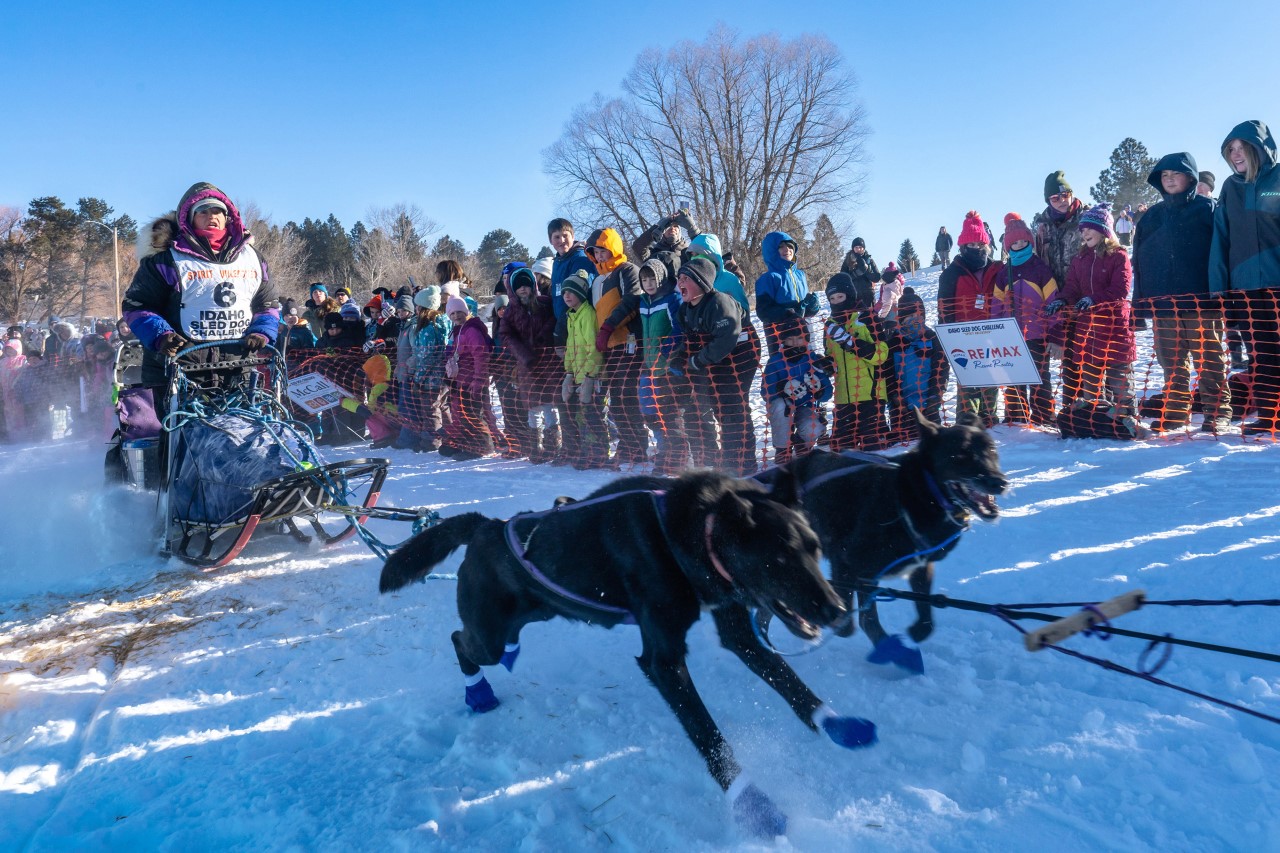Race reputed to be one of the toughest Iditarod and Yukon Quest qualifiersCASCADE, Idaho (Feb. 3, 2023) — With Montana mushers Jessie Royer and Nicole Lombardi winning this year’s 300-mile and 100-mile races, respectively, a trend officials have observed persists: Women continue to dominate the Idaho Sled Dog Challenge. According to ISDC founder and organizer Jerry Wortley, women have won eight of the 10 races they’ve staged since the event’s debut in 2018.Royer won the inaugural race in 2018 — a sole 237-mile course, then called the McCall Ultra Sled Dog Challenge — and the 300-mile race in 2020. Canadian musher Jennifer Campeau won the 150-mile race in 2019, when the name was changed to the Idaho Sled Dog Challenge and it joined Oregon’s Eagle Cap Extreme and Montana’s Race to the Sky to form the Rocky Mountain Triple Crown. Idaho musher Laurie Warren won ISDC’s 100-mile race in 2020. Montana musher Josi Thyr won the 300-mile race in 2022, and Lombardi won the 100-mile race.Montana musher Brett Bruggeman and Idaho musher Kevin Daugherty are the only males to ever win Idaho Sled Dog Challenge races — the 300-mile race in 2019 and the 52-mile Warm Lake Stage Race in 2023, respectively.The competition was cancelled in 2021 due to the COVID-19 pandemic.The final race standings for this year’s 300-mile race (266.5 total race miles) are:1. Jessie Royer (Seeley Lake, MT) — bib #6 — 50:21:16 — 8.07 mph avg.2. Josi Thyr (Olney, MT) — bib #8 — 51:03:31 — 8.24 mph avg.3. Jed Stephensen (Sandpoint, ID) — bib #7 — 52:03:42 — 8.41 mph avg.4. Erik Oline (Missoula, MT) — bib #2 — 53:12:00 — 7.73 mph avg.5. Bryce Mumford (Preston, ID) — bib #3 — 69:24:42 — 6.80 mph avg.6. Rex Mumford (Huntsville, UT) — bib #5 — 69:24:42 — 6.84 mph avg.7. Anna Bolvin (Porcupine Plain, Sask.) — bib #4 — N/A (scratched) — 7.92 mph avg.The final race standings for this year’s 100-mile race (102 total race miles) are:1. Nicole Lombardi (Lincoln, MT) — bib #21 — 16:09:57 — 10.03 mph avg.2. Jesika Reimer (Emigrant Gap, CA) — bib #11 — 16:39:58 — 9.79 mph avg.3. Wade Donaldson (Coalville, UT) — bib #12 — 17:11:31 — 9.19 mph avg.4. Dallin Donaldson (Coalville, UT) — bib #13 — 17:15:59 — 9.21 mph avg.5. Kevin Daugherty (McCall, ID) — bib #15 — 17:52:01 — 8.78 mph avg.6. Trevor Warren (Council, ID) — bib #20 — 17:57:32 — 8.56 mph avg.7. Thomas Blackham (Terreton, ID) — bib #10 — 18:34:04 — 8.14 mph avg.8. Bino Fowler (Bend, OR) — bib #17 — 19:35:27 — 7.60 mph avg.9 Maddie Longpre-Harrer (Calumet, MI) — bib #18 — N/A (scratched) — 8.45 mph avg.Thyr and Stephensen captured first and second place, respectively, in the 2023 Eagle Cap Extreme’s 200-mile race two weeks ago. And Lombardi, Reimer, and Fowler finished first, second, and third, respectively, in the Oregon event’s 100-mile race. The Idaho Sled Dog Challenge, Eagle Cap Extreme, and Montana’s Race to the Sky Feb. 11-14 comprise the Rocky Mountain Triple Crown.The final race standings for this year’s Warm Lake Stage Race (two 26-mile stages with the winner having the best average time):1. Kevin Daugherty (McCall, ID) — bib #7 — 4:15:39 — 10.33 mph avg.2. Ryan Roberts (Stevensville, MT) — bib #3 — 4:25:21 — 9.95 mph avg.3. Craig Anderson (Enterprise, OR) — bib #2 — 4:30:48 — 9.75 mph avg.4. Jana Roberts (Stevensville, MT) — bib #4 — 4:35:14 — 9.59 mph avg.5. Maddie Longpre-Harrer (Calumet, MI) — bib #1 — 4:41:36 — 9.38 mph avg.6. Jane Devlin (Bend, OR) — bib #6 — 4:50:00 — 9.10 mph avg.7 — Liz Nevills (Middleton, ID) — bib #5 — 5:23:46 — 8.15 mph avg.Race marshal Rick Katucki explained how several mushers who finished later reached higher average speeds than some who finished earlier.“The average speed is calculated using running time,” Katucki said. “In a continuous-format race, which the Idaho Sled Dog Challenge uses, mushers may rest their teams as long as they want. A faster team that stays in the checkpoint longer can finish later than one that rests less. Sled dog racing has a large management and strategy component, and in this instance the mushers with the faster teams finished later because they miscalculated how long they needed to stay or perhaps their checkpoint routines were not as efficient and they didn’t return to the trail as quickly as they might have. This is similar to a race car spending too much time at a pit stop.”This year’s Idaho Sled Dog Challenge, the fifth annual occurrence, attracted teams from eight states and one Canadian province. There were several family connections among the competing mushers, including a married couple (Jana and Ryan Roberts in the Warm Lake Stage Race), a father and son (Rex and Bryce Mumford in the 300-mile race), and two brothers (Dallin and Wade Donaldson in the 100-mile race).The Idaho Sled Dog Challenge features world-class mushers. It is the only 300-mile Yukon Quest qualifier in the lower 48 and one of only three such events for the Iditarod in the contiguous continental U.S. The Iditarod and the Yukon Quest are considered the longest and the toughest sled dog races in the world.According to ISDC co-founder and trails coordinator Dave Looney, the Idaho race is considered one of the most grueling mushing competitions in the world due to its topography.“Mushers will tell you this is a very, very atypical race,” Looney said. “Our elevation change is 39,000 feet, which is greater than the Iditarod. They call it a 500-mile race packed into 300 miles. So the dog care and the pacing and the attention they have to pay to the terrain is really important, because there’s a lot of up and down. One musher said the Idaho Sled Dog Challenge is like climbing Mt. Everest — twice.”The sixth annual Idaho Sled Dog Challenge is already on the calendar, with the Warm Lake Stage Race slated for Jan. 24-25, 2024, and the 300-mile and 100-mile races scheduled for Jan. 28-Feb. 1, 2024. The races operate under a special use permit from the U.S. Forest Service and is the recipient of an Idaho Travel Council grant secured by the McCall Area Chamber of Commerce & Visitors Bureau.Race organizers said the event couldn’t be staged without the generous support of its many sponsors and volunteers. Visit idahosleddogchallenge.com to sign up as a sponsor or volunteer for the 2024 race.

Montana mushers dominate Idaho Sled Dog Challenge
Latest Montana Hunting & Fishing Articles
The Montana Outdoor Radio Show is live Saturday Mornings from 6:06am to 8:00am
MT Waterfowl Hunting
2025-2026 Non-Member Waterfowl & Upland Game Bird Hunting Draft Proposal
Your chance to shape the future of hunting on the Flathead Reservation—share your thoughts on the 2025-2026 draft regulations…
The Department of Livestock Asks Montanans to be Aware of Avian Influenza
A Canada goose was confirmed infected in Gallatin County on February 26.
Get Your Goose on With the Ultimate Goose Jerky Recipe
It’s time to get your goose jerky on!
Trump Jr. Faces International Duck Poaching Probe
Donald Trump Jr.’s hunting trip in Italy just went from a wild adventure to a legal quagmire after he allegedly poached a rare duck—now, the hunt is on for answers.
Montana Hunting
Sheriff warns of escalating wolf attacks as elk dies yards from home; front stoop left bloodied
The Sierra County Sheriff’s Office in California reports residents are under siege from wolves, posting graphic photos of a bloodied stoop where an elk was brought down just yards from a residence. There have been 18 wolf attacks confirmed in 28 days.
Translocated wolf travels the equivalent of Denver to San Francisco in four months
A female gray wolf, released in Colorado in January after being translocated from British Columbia, has made significant movements across the state, covering more than 1,230 miles since translocation — an extraordinary display of the species’ natural roaming behavior.
Correction made to hound hunting season dates in 2025 Black Bear Regulations
IMPORTANT: The season dates for hound hunting season in the printed version of the 2025 Black Bear Regulations were incorrectly listed in the printed regulations.
MSU Extension and Montana Fish, Wildlife and Parks to host public meetings on wild and domestic sheep interactions
A series of free, public meetings will be held in Montana communities in April and May to discuss the Wild and Domestic Sheep Comingling Project.
Governor Gianforte Promotes Bear Safety at Small Business in Butte
UDAP Industries, Inc. was founded by Mark Matheny after a life-altering experience in the Montana backcountry. In 1992, while hunting near Yellowstone National Park, Matheny survived a grizzly bear attack thanks to a canister of pepper spray used by his hunting partner.
Hum a Few Bars
Tiny travelers are returning to Montana — get ready to welcome the amazing hummingbirds back to Big Sky Country!
Montana Fishing Reports
Gallatin River Fishing Report 4.28.25
The Gallatin River is fishing great right now, with nymphs and worms leading the charge as runoff begins and fish are biting from the park to the valley…
FWP Helena Area Reservoirs Fishing Report 4.28.25
Spring fishing is heating up across Canyon Ferry, Hauser, and Holter — from shoreline rainbows to deep-water walleye, there’s action for every angler!
Madison River Fishing Report 4.24.25
Spring’s showing off on the Madison—hungry fish, perfect temps, and some serious action if you know where (and how) to look…
Montana Ice Fishing
When Ice Fishing Becomes a Rescue Mission
A peaceful day of ice fishing shattered in an instant…
Chasing Ice: For Some, the Season’s Over
Some anglers are stuck dreaming of frozen lakes, while others are packing their gear and chasing the last ice—where do you stand?
LAST ICE HEIST!!!
As Canyon Ferry’s ice fades fast, one last thrilling ice fishing adventure delivers big trout and bigger lessons—before the season slips away! More from Montana Grant here!
ICE DOESN’T CARE!!!
As Montana’s late-season ice thins and conditions become unpredictable, anglers are urged to stay cautious—no fish is worth the risk.
FWP’s Helena Area Reservoirs Fishing Report 3.10.25
Ice conditions are unpredictable, but for those willing to take precautions, the fishing has been excellent across Helena area waters.
Montana Outdoor Podcast
MT Outdoor Podcast: Are These the Kokanee Salmon You Were Looking For?
Time for Your Refresher Course on How to Catch HUGE Kokanee Salmon in Holter & Hauser Reservoirs From Kit & Trevor Johnson of Kit’s Tackle Outfitters…
Sponsors:
Back by Popular Demand: The Podcast Everyone’s Talking About – “Double Bacon Cheeseburger with Fins” Returns This Week!
Back by popular demand, this week’s Montana Outdoor Podcast dives deep into the surprising fish behind Fort Peck’s trophy giants—don’t miss “Double Bacon Cheeseburger with Fins.”
MT Outdoor Podcast: The History and Effects of the Introduction of the Cisco into Fort Peck Reservoir
What do deep-water monsters and a double bacon cheeseburger have in common? Tune in to the Montana Outdoor Podcast to find out…
MT Outdoor Podcast Sneak Peek: Downrigger Talks About the Fort Peck Cisco with Andrew McKean
What do a double bacon cheeseburger and Fort Peck’s biggest fish have in common?
MT Outdoor Podcast: Casting Lines and Relationship Goals with the Goodmans
What do you get when a seasoned angler takes his date fishing, forgets to mention the eel-like fish might hug her arm, and somehow still ends up married? Hook into this MT Outdoor Podcast episode to hear it all!
Outdoor How-To
How To Win the Recall Battle with Your Dog
Tired of playing keep-away with your dog while you’re at hunting camp, fishing, on the trapline or hunting? Even well-trained dogs have their moments! Learn the secret to achieving total recall—no chasing required!
A Feud Over Filleting Has The Internet Debating the ‘Right’ Way to Clean a Pike
When it comes to filleting a northern pike, the internet has spoken—and, as usual, everybody is right and wrong, simultaneously….
How To Master the Art of Finding Antlers
Whether it’s sharp eyes, pure skill, or just a dog with a better nose, shed hunting success is up for debate—but this video might just tip the odds in your favor…
MT Wildlife
Don’t Pet Wildlife–Even When You Want To
Remember that wildlife is wild…
When Guests Are Cold-Blooded and Uninvited
When your Ring doorbell says there’s someone at the door, you just never know what to expect in Florida…
Reed Slough Wildlife Viewing Area near Kalispell opens to public
On Saturday, Montana Fish, Wildlife & Parks’ Director Christy Clark, FWP staff and local stakeholders cut the ribbon on the brand-new Reed’s Slough Wildlife Viewing Area.
Montana Tourney Trail
2025 Spring Mack Days – Week 7 Update
Flathead Lake anglers are smashing records at the 2025 Spring Mack Days, hooking tens of thousands of lake trout — and there’s still time to join the action…
Viral Stories
In 1916 They Blew Up A Yellowstone Grizzly Bear with Dynamite After it Killed A Man
In 1916, Yellowstone National Park recorded its first officially documented fatal grizzly bear attack. The victim, Frank Welch, a 61-year-old […]
Irish Woman Sues Wyoming Dude Ranch After Bear Spray Incident Leaves Her Injured
An Irish woman, Lorraine Learmont, has filed a lawsuit against the Triangle C Ranch near Dubois, Wyoming, following an incident […]
Watch This Elk Play a Friendly Game of Backyard Soccer
This smart and friendly elk has serious footwork when it comes to soccer.
Montana FWP
Anglers charged by grizzly bear in Centennial Valley
Fortunately, anglers were unharmed
2025 Fort Peck walleye spawn FINAL update, April 20th
Warm water temps have sparked a major surge in walleye activity—and the numbers coming out of Fort Peck might just surprise you.
Wild Game Recipes
Turkey-Stuffed Morel Mushroom Recipe
Wild turkey meets wild mushrooms in this easy, flavor-packed spring recipe you’ll want to make all season long…
Cheesy Pull Apart Venison Meat Ball Bombs Recipe
Venison, cheese, and biscuits come together in one bite-sized, pull-apart appetizer that’s almost too good to share…



